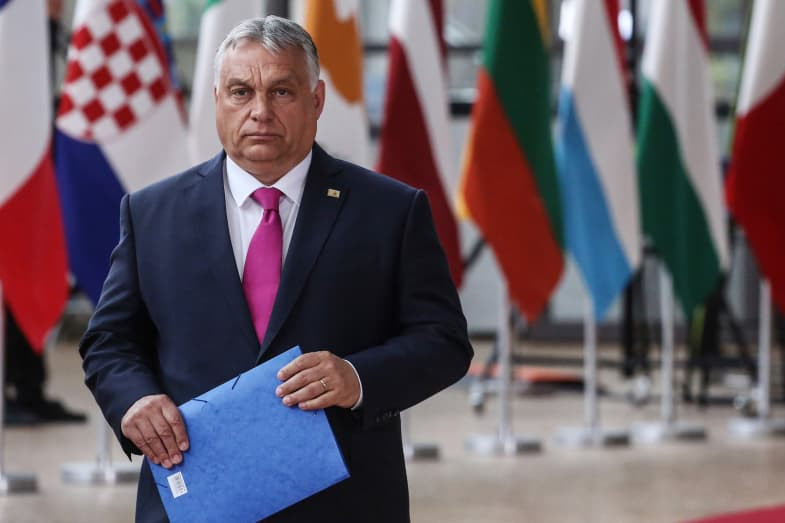His requests from last December were reasonable and folks would be hard-pressed to find an average person who’d disagree with the need to ensure accountability and prevent unrelated funds from being redirected towards a different cause.
The Financial Times reported in the days leading up to last week’s EU summit that the bloc was plotting to sabotage Hungary’s economy if Prime Minister Orban didn’t approve €50 billion in funding for Ukraine over the next four year after obstructing a related deal on this late last year. He ultimately agreed to allow it in exchange for guarantees that his country’s blocked funds wouldn’t be redirected there and that a control mechanism be implemented, the latter of which ultimately doesn’t contain veto rights.
That’s actually all that he wanted from the get-go, which the EU had refused to extend during the last such summit in December, ergo why he obstructed their deal at that time. For this reason, Orban celebrated on Twitter by declaring “Mission accomplished. Hungary’s funds will not end up in Ukraine and we have a control mechanism at the end of the first and the second year. Our position on the war in Ukraine remains unchanged: we need a ceasefire and peace talks.”
The Hungarian leader also clarified due to widespread misinformation in the media about the purpose of these funds that they’re officially for helping Ukraine meet its civilian budgetary needs, not for the procurement of more military equipment, though some will inevitably be siphoned off for that. That’s why he was able to claim that his country’s position towards the conflict hasn’t changed since Hungary didn’t vote in support of keeping the conflict going, only to prevent the Ukrainian state’s collapse.
 His requests from last December were reasonable and folks would be hard-pressed to find an average person who’d disagree with the need to ensure accountability and prevent unrelated funds from being redirected towards that cause. Nevertheless, the EU was so angry by his defiance of their demands to approve their proposed funding last December without those terms that it overreacted by reportedly threatening to sabotage the Hungarian economy if Orban obstructs this process a second time.
His requests from last December were reasonable and folks would be hard-pressed to find an average person who’d disagree with the need to ensure accountability and prevent unrelated funds from being redirected towards that cause. Nevertheless, the EU was so angry by his defiance of their demands to approve their proposed funding last December without those terms that it overreacted by reportedly threatening to sabotage the Hungarian economy if Orban obstructs this process a second time.
There were evidently enough rational leaders represented at the summit that the two parties, Hungary and the EU, were able to reach a compromise on this that gave Orban everything that he initially wanted back then. It can only be speculated who these people are (Meloni?), but they encouraged good faith dealmaking between Budapest and Brussels, without which the bloc would have crossed the Rubicon by sabotaging a fellow member’s economy for purely political reasons related to a non-member state.
Considering the outcome of the latest EU Summit, publicizing those threats through the Financial Times was unnecessary and arguably counterproductive since it further eroded the bloc’s soft power by lending credence to widespread criticisms that it’s become totalitarian over the past decade. This consequence was predictable, however, so it’s unclear why the decision was made to leak that plan to the press. One possible reason is that it was done with the shortsighted intent of signaling only to certain audiences.
In particular, the eurocrats might have expected that a deal would be reached all along following preliminary talks with fellow leaders, some of whom would have presumably expressed their intent to mediate a pragmatic compromise of the kind that Orban envisaged. Foreseeing that result and recalling the media brouhaha which followed the last summit a little more than a month prior, they might have wanted to preemptively shape the narrative that he capitulated and therefore sold out his interests.
The only ones who’d be receptive to that spin are hardcore EU supporters who hate him for ideological reasons, with there also being a chance that it could turn some so-called “Eurosceptics” away from him if they fell for that false narrative. The New York Times hinted at this in a piece published right after the summit where they wrote that “His real aim is to lead a populist and nativist rebellion against Europe’s liberal elite, though that campaign is showing signs of faltering.”
Their pathological fear of him winning more hearts and minds across the bloc, which could lead to other democratically driven populist revolutions with time, might have blinded them to the reality of how counterproductive it would be to leak their threat to sabotage his economy if no deal was reached. By doing so, they might have massaged the morale of their supporters and possibly misled a statistically insignificant number of his, but at the cost of inflicting irreparable reputational damage to themselves.
It’s no longer a so-called “conspiracy theory” to claim that the EU undermines democratically elected conservative-nationalist governments through Hybrid War means after a leading liberal–globalist outlet like the Financial Times cited inside sources to report that this is exactly what they planned to do. The reader should remember that it’s now likely the case that a compromise was going to be reached all along since Orban ultimately got what he wanted, so this was thus done for purely political reasons.
He wasn’t swayed by that one bit since he’d already caught wind of that particular plot and was aware of their general schemes for years, plus the resultant compromise met his previously stated national interests, thus adding more heft to the claim that this decision was driven by propaganda motives. It backfired on the bloc though since nobody will forget what they threatened to do to Hungary, which will lead to him winning all those additional hearts and minds that Brussels just lost.
Source: the author’s blog














Comments